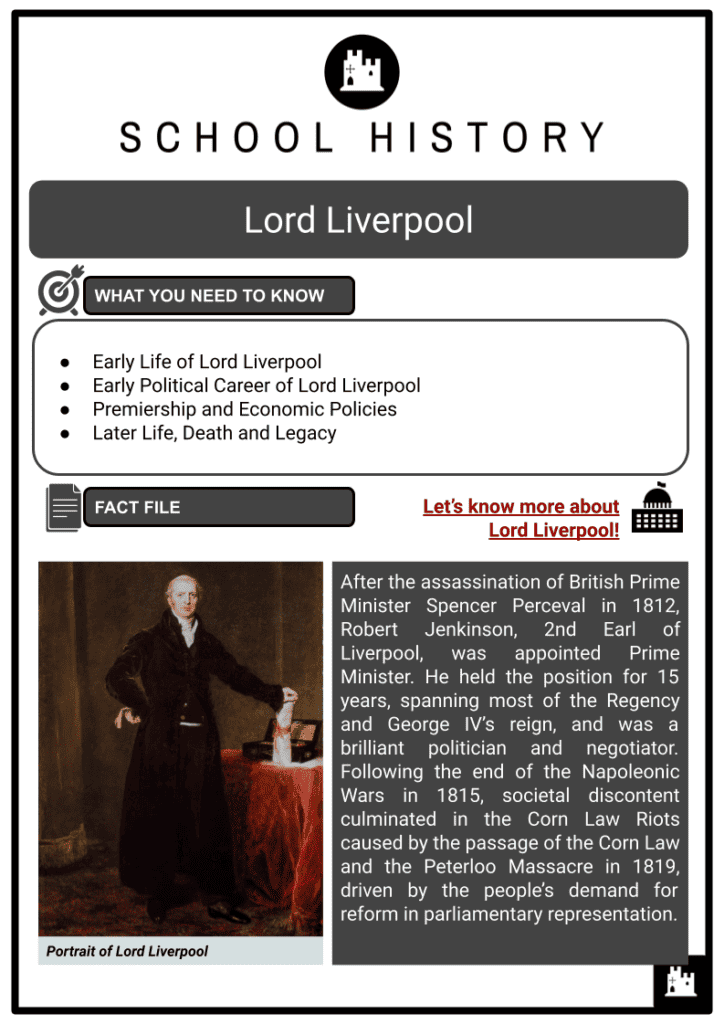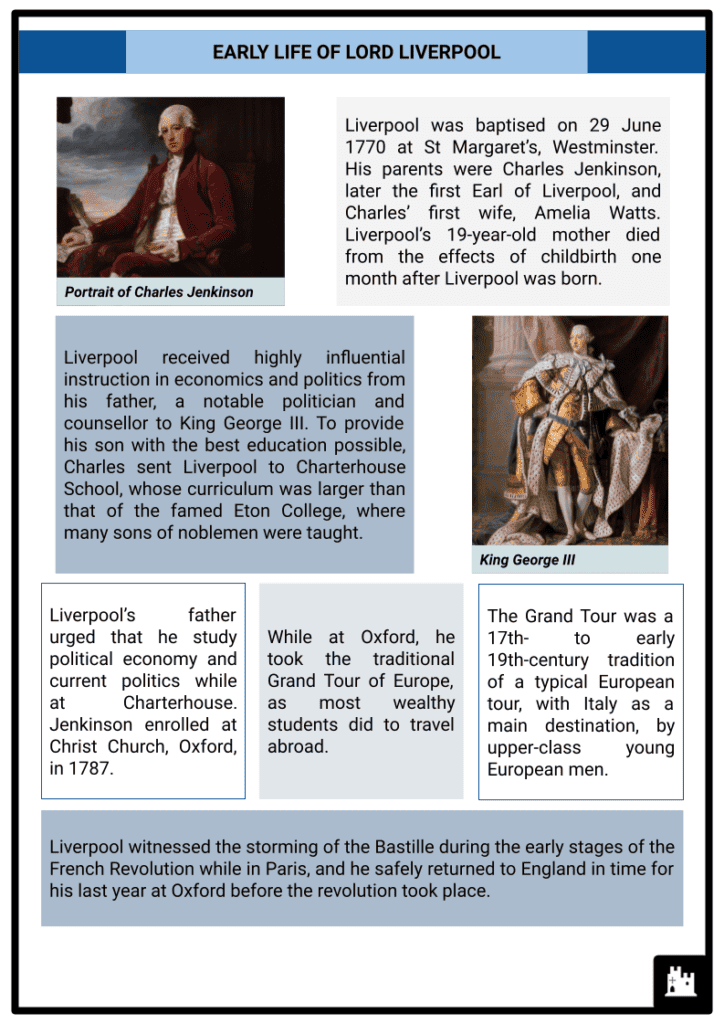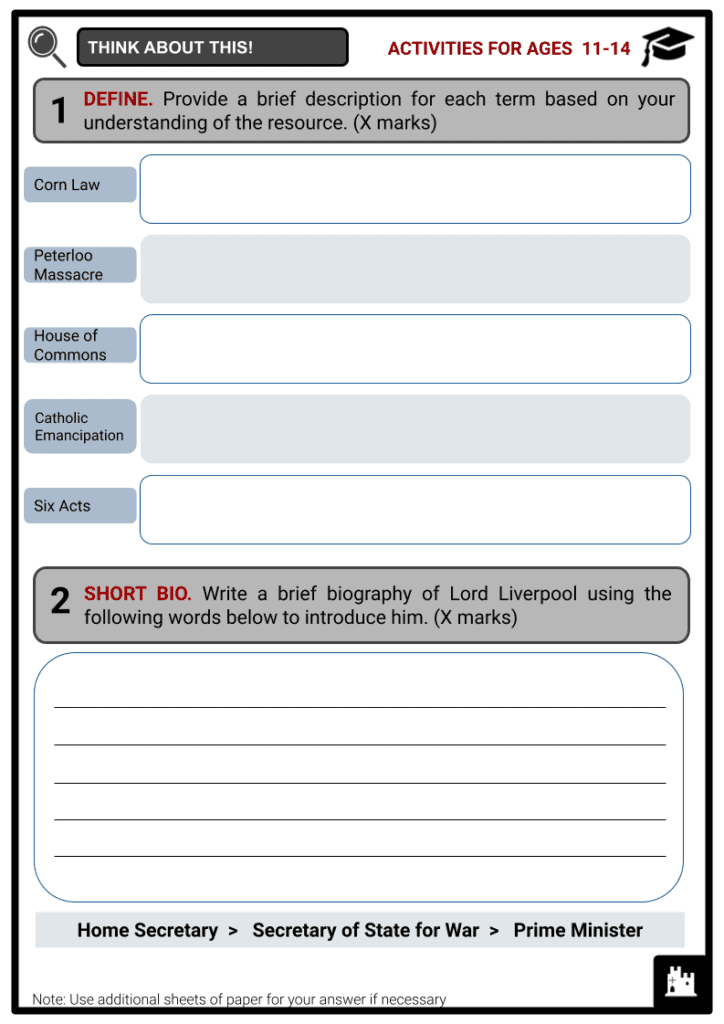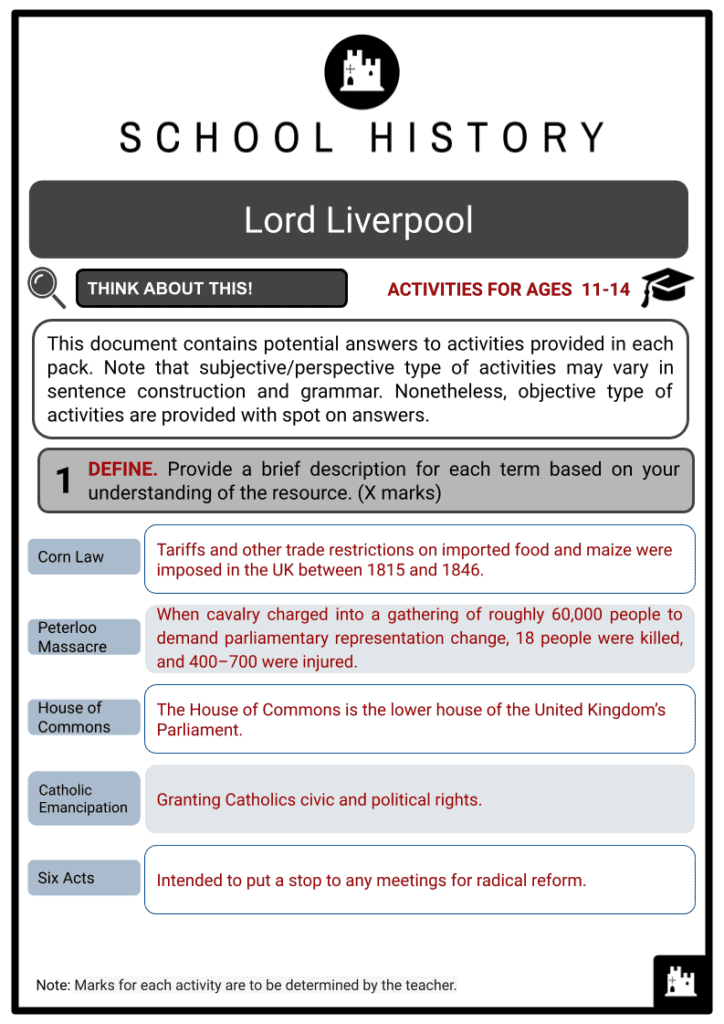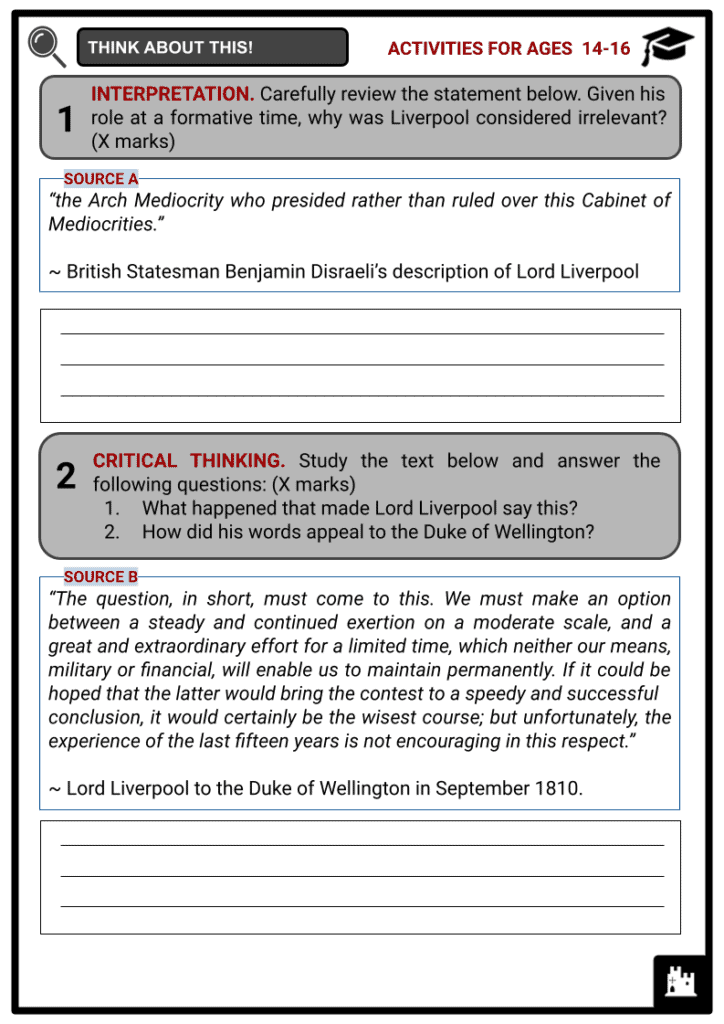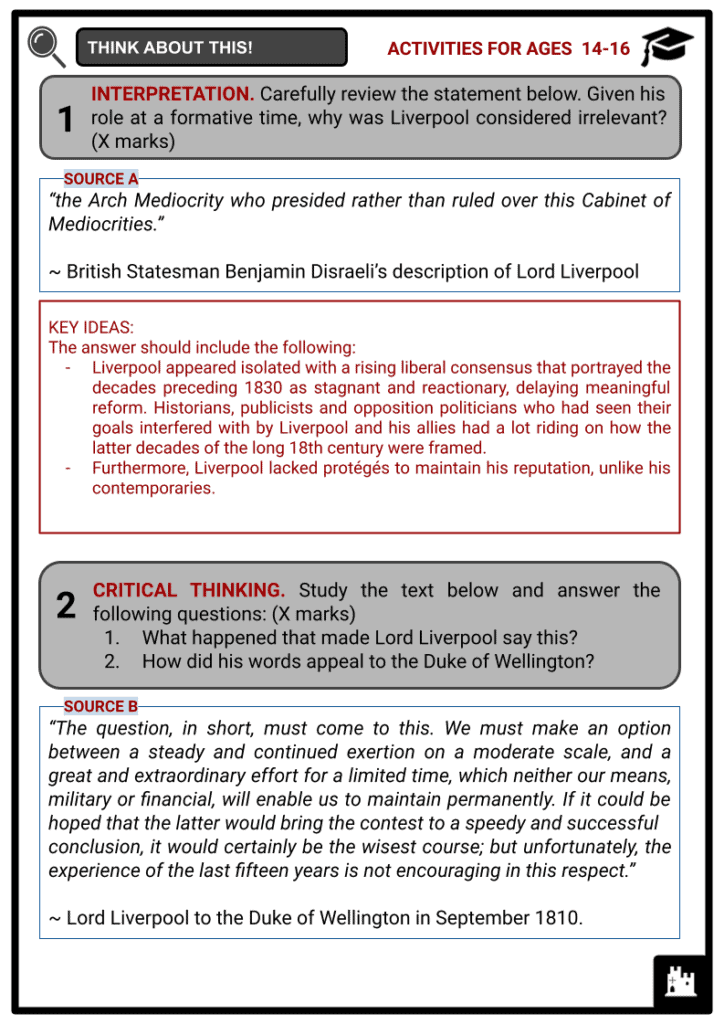Lord Liverpool Worksheets
Do you want to save dozens of hours in time? Get your evenings and weekends back? Be able to teach about Lord Liverpool to your students?
Our worksheet bundle includes a fact file and printable worksheets and student activities. Perfect for both the classroom and homeschooling!
Summary
- Early Life of Lord Liverpool
- Early Political Career of Lord Liverpool
- Premiership and Economic Policies
- Later Life, Death and Legacy
Key Facts And Information
Let’s know more about Lord Liverpool!
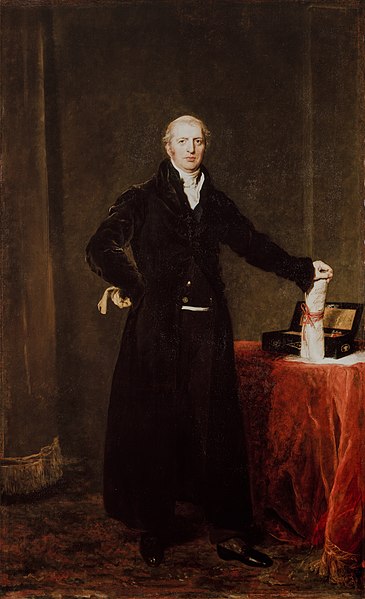
After the assassination of British Prime Minister Spencer Perceval in 1812, Robert Jenkinson, 2nd Earl of Liverpool, was appointed Prime Minister. He held the position for 15 years, spanning most of the Regency and George IV’s reign, and was a brilliant politician and negotiator. Following the end of the Napoleonic Wars in 1815, societal discontent culminated in the Corn Law Riots caused by the passage of the Corn Law and the Peterloo Massacre in 1819, driven by the people’s demand for reform in parliamentary representation.
EARLY LIFE OF LORD LIVERPOOL
- Liverpool was baptised on 29 June 1770 at St Margaret’s, Westminster. His parents were Charles Jenkinson, later the first Earl of Liverpool, and Charles’ first wife, Amelia Watts. Liverpool’s 19-year-old mother died from the effects of childbirth one month after Liverpool was born.
- Liverpool received highly influential instruction in economics and politics from his father, a notable politician and counsellor to King George III. To provide his son with the best education possible, Charles sent Liverpool to Charterhouse School, whose curriculum was larger than that of the famed Eton College, where many sons of noblemen were taught.
- Liverpool’s father urged that he study political economy and current politics while at Charterhouse. Jenkinson enrolled at Christ Church, Oxford, in 1787.
- While at Oxford, he took the traditional Grand Tour of Europe, as most wealthy students did to travel abroad.
- The Grand Tour was a 17th- to early 19th-century tradition of a typical European tour, with Italy as a main destination, by upper-class young European men.
- Liverpool witnessed the storming of the Bastille during the early stages of the French Revolution while in Paris, and he safely returned to England in time for his last year at Oxford before the revolution took place.
EARLY POLITICAL CAREER OF LORD LIVERPOOL
Member of Parliament
- Liverpool was elected to the House of Commons for Rye in 1790, a seat he would hold until 1803. However, he was under the age of consent to Parliament at the time, so he declined to take his seat and spent the following winter and early spring on an extended tour of the continent. This journey brought him to the Netherlands and Italy, and by the end of it, he was old enough to sit in Parliament.
- Liverpool advanced quickly in the Tory government because of his father’s influence and political talent. He responded to a British politician, Samuel Whitbread’s critical motion on the government’s Russian policy in February 1792. During the session, Liverpool delivered several further addresses and was a vocal opponent of abolitionism and William Wilberforce, leader of the movement to abolish the transatlantic slave trade. From 1793 until 1796, he was a member of the Board of Control for India.
- Liverpool was one of the first government officials to enrol in the militia following the commencement of hostilities with France. In 1794, he was promoted to colonel in the Cinque Ports Fencibles, and his military activities required frequent absences from the Commons. In 1796, his regiment was moved to Scotland, where he was quartered for a period in Dumfries.
- In 1797, Liverpool was the cavalry commander of the Cinque Ports Light Dragoons, who went rogue during a demonstration against the Militia Act in Tranent, East Lothian, killing 12 citizens. Liverpool’s parliamentary attendance was also hampered by his father’s vehement opposition to his planned marriage with Lady Louisa Hervey, daughter of the Earl of Bristol. After the King intervened on Liverpool’s behalf, the wedding occurred on 25 March 1795 at Wimbledon.
Foreign Secretary
- As the issue of Catholic Emancipation became obvious, and the King refused to pass legislation, Prime Minister William Pitt the Younger resigned as a result. This retirement left the King with the task of appointing a successor, and he chose Henry Addington, one of Pitt’s prominent allies, as the new prime minister.
- Catholic Emancipation was a process in the late 18th and early 19th centuries in the kingdoms of Great Britain and Ireland, and later the combined United Kingdom, that involved reducing and removing many of the restrictions on Roman Catholics imposed by various acts such as the Test Acts.
- When Addington’s government came to power in 1801, Liverpool was appointed Secretary of State for Foreign Affairs. Addington’s main political objective was peace, and as prime minister, he promised to talk with the French. Addington tasked him with negotiating with France and pursuing an immediate peace treaty in this position, which he set out to do as his first responsibility.
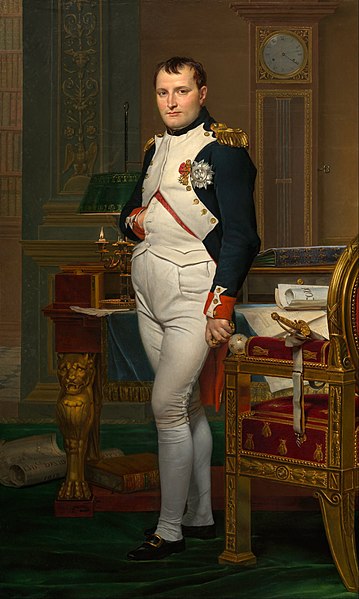
Napoleon Bonaparte - As Foreign Secretary, Liverpool had to confront the European situation brought on by the French Revolutionary War and negotiate peace as quickly as feasible. Britain and its continental allies could not defeat France in any way, and the length of the war itself resulted in a period of instability as the British war effort was overburdened by over a decade of fighting with no results.
- Liverpool began negotiations with France following Addington’s intentions. Liverpool quickly contacted Louis Guillaume Otto, the French commissary for prisoners of war in London, via whom he could contact and accede to French military commander Napoleon Bonaparte’s prior suggestions.
- By mid-September, Liverpool had dispatched diplomat Anthony Merry to Paris to begin a second round of talks with his French colleague, French Foreign Minister Talleyrand. This led to the signing of the Treaty of Amiens and bringing the Second Coalition War to a close. The Second Coalition War was the second phase of war during the French Revolutionary War.
Home Secretary
- Pitt the Younger reappointed the previous Foreign Secretary when he returned to power for the second time, and he quickly continued to serve in the Cabinet as Home Secretary in Pitt’s second ministry.
- Pitt the Younger became unwell shortly after becoming Prime Minister and was hospitalised throughout 1805. Despite a grave sickness, he controlled the ongoing war in Europe and kept his Cabinet and country together against the French will-power. While Pitt was hospitalised, Liverpool oversaw the government and wrote King George III’s speech for the official opening of Parliament. When William Pitt died in 1806, the King sought to appoint a successor and urged Home Secretary Liverpool to assume the position of Prime Minister. Still, he rejected it because he did not believe he had a ruling majority.
War Secretary
- Liverpool had assumed the title of Lord Liverpool by this point due to his father’s death in December 1808. Following the demise of the Whig Portland cabinet, Spencer Perceval rose unexpectedly to the position of Prime Minister. Perceval hesitated to nominate a fellow Tory to his Cabinet because the Whigs were fragmented and unified, allowing the Tories to govern against them, and he urged Liverpool to join his new administration. In 1809, Liverpool accepted the Secretary of State for War and Colonies post in Perceval’s new Cabinet.
PREMIERSHIP AND ECONOMIC POLICIES
- When Perceval was slain in May 1812, George, the Prince Regent, tried unsuccessfully to appoint four men to succeed him; Liverpool, the fifth candidate, grudgingly took office on 8 June 1812. The Cabinet chose Liverpool as his successor, with Robert Stewart, Lord Castlereagh as the leader of the House of Commons, but both resigned following an unfavourable vote in the Lower House.
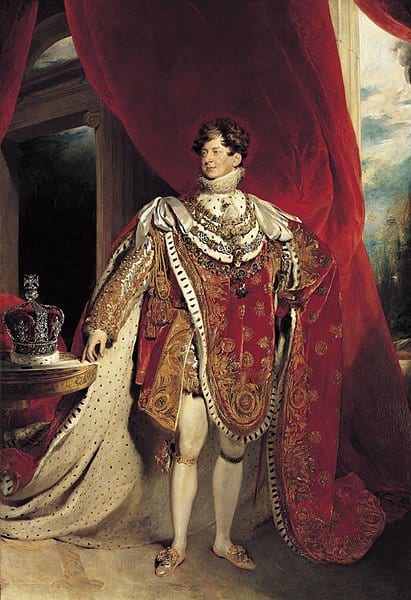
George, the Prince Regent - Liverpool faced direct battle at the start of his premiership, as the War of 1812 with the United States (US) and the concluding campaigns of the Napoleonic Wars were waged during his tenure. The War of 1812 was fought in British North America by the US and its Indigenous allies against the United Kingdom (UK) and its indigenous allies, with minimal participation by Spain in Florida. The British army headed by the Duke of Wellington drove the French out of Spain and Portugal during the Peninsular Campaigns.
- Liverpool’s main aim during the subsequent peace talks was to get a European solution to secure the independence of the Netherlands, Spain and Portugal while keeping France inside its pre-war borders without jeopardising its national integrity. To do so, he was willing to return all British colonial victories. Within this broad framework, he delegated authority to Stewart, at the Congress of Vienna, the following most important event in his ministry.
- At the assembly, he quickly approved Castlereagh’s audacious attempt to form a defensive alliance with Austria and France in January 1815. Following Napoleon’s defeat, he was briefly exiled to the island of Elba, fled exile and returned to rule France.
- The allied countries promptly began mobilising their troops to attack the escaping emperor, and an Anglo-Allied army led by Wellington was dispatched to support Britain’s allies. Napoleon was defeated at the Battle of Waterloo within a few months, and calm reigned throughout the increasingly weary continent.
- The Battle of Waterloo happened on 18 June 1815, near Waterloo (at the time in the UK of the Netherlands, now in Belgium), and marked the end of the Napoleonic Wars.
- The British Empire was thriving and spreading around the globe in 1815, rising to become the greatest colonial empire of all time. As the 20-year-long European war concluded with peace, Britain, Austria, Russia and France finally established themselves as major powers. However, at this moment, Britain had shown itself to be a vastly superior power to any other nation in Europe.
- Agriculture remained a concern because good harvests between 1819 and 1822 lowered prices and prompted a call for greater protection. In the aftermath, when the large agricultural lobby in Parliament requested protection, Liverpool succumbed to political necessity. The infamous Corn Laws of 1815 were enacted under government control, restricting the import of foreign wheat until the local price reached a minimum acceptable level.
- The interest on the national debt, significantly inflated by the immense expenditure of the later war years and war pensions, took the share of normal government revenue. The House of Commons’ failure to renew the wartime income tax in 1816 left ministers with no immediate alternative except to continue the destructive system of borrowing to satisfy necessary annual expenses. Liverpool advocated for the abolition of the larger transatlantic slave trade at the Congress of Vienna and backed the repeal of the Combination Laws, which prohibited workers from forming trade unions, in 1824.
- Following the Peterloo Massacre in 1819, Liverpool’s government enacted the oppressive Six Acts legislation, which restricted, among other things, free speech and the ability to gather in peaceful protest. As a result of these efforts, Liverpool and other cabinet officials were assassinated in 1820. They were saved when the Cato Street plot was discovered.
- The Catholic Emancipation was a source of contention in the nineteenth century, particularly under Liverpool’s premiership. In his first major speech on the matter in 1805, Liverpool stated that the monarch’s special relationship with the Church of England and Roman Catholics’ unwillingness to take the oath of supremacy justified their exclusion from political power.
LATER LIFE, DEATH AND LEGACY
- Louisa, Liverpool’s first wife, died at the age of 54. On 24 September 1822, he married Lady Mary Chester, a long-time companion of Louisa. Liverpool finally withdrew on 9 April 1827, two months after suffering a severe cerebral haemorrhage at his Fife House apartment in Whitehall, and begged the King to appoint a replacement.
- He suffered another mild stroke in July, following which he remained at Coombe until his death on 4 December 1828 from a third attack. He died childless, and his younger half-brother Charles succeeded him as Earl of Liverpool. He was buried with his father and first wife in Hawkesbury parish church in Gloucestershire.
- Liverpool was considered the first British Prime Minister to wear long trousers instead of knee breeches daily. He was 42 years and one day old when he took office, making him younger than any of his successors. Liverpool held the position of Prime Minister for 15 years, making him the 19th century’s longest-serving Prime Minister.
- Liverpool Street and Liverpool Road in Islington, London, are named after Lord Liverpool. Lord Liverpool was named after the Canadian town of Hawkesbury, Ontario, the Hawkesbury River and the Liverpool Plains in New South Wales, Australia, Liverpool in New South Wales, and the Liverpool River in Australia’s Northern Territory.
Image Sources
- https://en.wikipedia.org/wiki/File:Robert_Banks_Jenkinson,_2nd_Earl_of_Liverpool.jpg
- https://en.wikipedia.org/wiki/File:Jacques-Louis_David_-_The_Emperor_Napoleon_in_His_Study_at_the_Tuileries_-_Google_Art_Project.jpg
- https://en.wikipedia.org/wiki/File:King_George_IV_of_the_United_Kingdom_in_Coronation_Robes_(by_Thomas_Lawrence)_-_Royal_Collection_(RCIN_405918).jpg
Frequently Asked Questions
- Who was Lord Liverpool?
Lord Liverpool, born Robert Banks Jenkinson, was a prominent British statesman who served as the Prime Minister of the United Kingdom from 1812 to 1827.
- What were Lord Liverpool's significant achievements during his time as Prime Minister?
Lord Liverpool's tenure as Prime Minister saw him navigate through significant events, including the final stages of the Napoleonic Wars, the Congress of Vienna, the post-war economic challenges, and the early years of the Industrial Revolution in Britain.
- What happened to Lord Liverpool?
Lord Liverpool suffered a severe stroke in 1827, which left him partially paralysed. He had to retire from politics, and George Canning succeeded him as Prime Minister. Lord Liverpool's health did not improve, and he passed away on 4 December 1828, due to the effects of the stroke.

